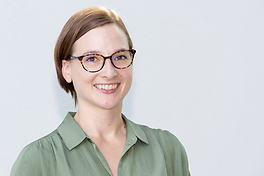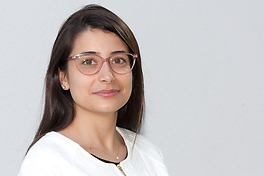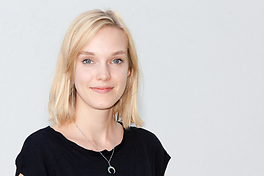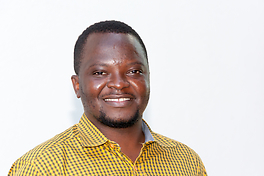September 17, 2020 | News | Welcome to the MPIDR
Five New PhD Students

New PhD students at MPIDR: Carolina Coimbra, Sarah Johnson, Benson John, Maria Gültzow and Donata Stonkute. © MPIDR/Wilhelm
In September five PhD students from five countries started their research projects at the MPIDR in Rostock. They work in fields like population health, fertility and digital demography.

© MPIDR/Wilhelm
Sarah Johnson
1) What question drives you most in your research?
I'm always on the lookout for unconventional data sources and innovative methods that can help fill knowledge gaps in population health. In the past I've worked on methods to transform heterogeneous, incomplete cause-specific mortality data into globally comparable results leveraged by policy-makers to set health priorities. Throughout my doctoral research, I hope to apply these same skills to answering questions on trends in migration.
2) What are you particularly looking forward to as you start working at MPIDR?
With the recent explosion of digital data sources, an emphasis on multidisciplinary research is more important than ever. It's no secret that the Digital and Computational Demography Lab is highly interdisciplinary, and I'm looking forward to learning from colleagues with a range of backgrounds and experiences.
3) What do you like most about Rostock?
Despite Seattle being one of the most bike-friendly cities in the US, it pales in comparison to Germany! I'm very excited to be able to ride my bike stress-free around Rostock and receive no strange looks for carrying a bike pannier into a grocery store.
4) What are you obsessed with at the moment besides demography?
Rock climbing is one of my favorite hobbies, and I hope to visit Southern Germany at some point where I can find some mountains! I was certainly disappointed that the Olympics were delayed due to COVID-19, since sport climbing was due to make its Olympic debut.

© MPIDR/Wilhelm
Carolina Coimbra Vieira
1) What question drives you most in your research?
The question that drives me most at the moment lies in the bidirectional relation between migration and cultural diffusion. Cultural aspects are one of the factors that make people move while migration also affects the culture inside the regions. By using Online Social Media data, such as Facebook Ads data, I would like to measure how the culture contributes to the migration between countries and how the cultural influence of migrant populations inside other countries affects the remaining population's preferences.
2) What are you particularly looking forward to as you start working at MPIDR?
Thanks to the multidisciplinary environment at MPIDR, I will have the opportunity to share my knowledge as a computer scientist, invest my time in detailed and rigorous research work, as well as to learn with scholars and scientists of different backgrounds. I am sure that it will be a very enriching experience with ample opportunity to meet other researchers from all over the world and learn from them.
3) What do you like most about Rostock?
Having spent several months at the institute as a guest researcher, I had the opportunity to know many special places in the city. The zoo, the city center, and Warnemunde are my favorites. The office view is an additional plus! It is amazing!
4) What are you obsessed with at the moment besides demography?
To cook, to ride on a bike, and to be in contact with nature are things that I love to do, especially when I want to relax.

© MPIDR/Wilhelm
Maria Gültzow
1) What question drives you most in your research?
What drives me most in my research is the question of how we can maintain good health overall. With my research I hope to support evidence-based decision making in policies regarding public health, specifically prevention of non-communicable diseases.
2) What are you particularly looking forward to as you start working at MPIDR?
At MPIDR, I am looking forward to working with many different minds from different backgrounds. This will for sure lead to really interesting research collaborations.
3) What do you like most about Rostock?
I actually grew up not too far away from Rostock and used to come here a lot when I was a teenager. I haven’t been back since and I am really excited to rediscover the city! I always loved the beach and how close it is to the city.
4) What are you obsessed with at the moment besides demography?
I’m sure, I’m not the only one, but since the whole corona situation I’ve been spending more time on my hobbies. At the moment I’m obsessed with sewing but also bouldering. I definitely want to try to get into bouldering more when I’m in Rostock.
Donata Stonkute
1) What question drives you most in your research?
The question that drives me the most at the moment is socioeconomic health inequalities. As a doctoral student, I would like to analyze educational inequalities across Europe in life expectancy free of physical disabilities, in particular, illustrating the gap between the Eastern and Western Europe, as well as, what country-level and individual-level factors may be contributing to widening these gaps.
2) What are you particularly looking forward to as you start working at MPIDR?
I am looking forward to steepen my learning curve. With such a collection of great mentors, opportunities to join courses and seminars, and to access educational materials, MPIDR is a perfect place to learn the necessary skills to be able to navigate research in the future.
3) What do you like most about Rostock?
It is my first week in Rostock but I already grasped a youthful spirit of the city. Perhaps due to a large student population, finding cozy cafes and pubs is easier than in any other city I have lived. I also like a perfect balance between urban buzz and peaceful nature retreats in the city.
4) What are you obsessed with at the moment besides demography?
Different (usually distant) cultures. I was learning Korean language 10 years ago, later moved to a Pakistani family house in the UK in order to learn their cultural and religious practices, as well as, to learn some of the Urdu. This experience was followed by a trip to Ukraine in order to explore the cultural and political differences between Eastern and Western Ukrainian municipalities. The most recently I went to Nepal, where besides research, I indulged myself into pure Sherpa lifestyle for a week.

© MPIDR/Wilhelm
Benson John
1) What question drives you most in your research?
I am interested in conducting a thorough and broad investigation of the union-fertility nexus and fertility variation in Africa. I want to document the role of separation and remarriage in defining the level and pattern of fertility. Among other things, I will seek to find out the fertility contribution of women who experience separation and remarriage to overall fertility, and how it fluctuates across levels of education, space and time.
2) What are you particularly looking forward to as you start working at MPIDR?
I am delighted about the opportunity to participate in the IMPRS-PHDS courses and to interact with a highly interdisciplinary team of researchers at MPIDR. I am looking forward to developing strong and advanced skills in modelling, simulation, and data science through this doctoral programme.
3) What do you like most about Rostock?
I enjoy the evening breeze by the riverside. I have always wanted to live close to a lake or a big river. I did not have that chance in Malawi. But I do have it now.
4) What are you obsessed with at the moment besides demography?
I am taking some lessons on how to play a guitar. I like music, and I want to learn to sing and play along with the guitar.